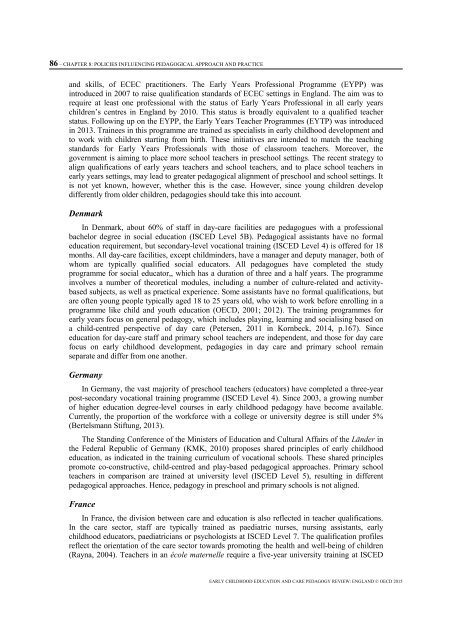early-childhood-education-and-care-pedagogy-review-england.pdf?utm_content=bufferb49b1&utm_medium=social&utm_source=twitter
early-childhood-education-and-care-pedagogy-review-england.pdf?utm_content=bufferb49b1&utm_medium=social&utm_source=twitter
early-childhood-education-and-care-pedagogy-review-england.pdf?utm_content=bufferb49b1&utm_medium=social&utm_source=twitter
You also want an ePaper? Increase the reach of your titles
YUMPU automatically turns print PDFs into web optimized ePapers that Google loves.
86 – CHAPTER 8: POLICIES INFLUENCING PEDAGOGICAL APPROACH AND PRACTICE<strong>and</strong> skills, of ECEC practitioners. The Early Years Professional Programme (EYPP) wasintroduced in 2007 to raise qualification st<strong>and</strong>ards of ECEC settings in Engl<strong>and</strong>. The aim was torequire at least one professional with the status of Early Years Professional in all <strong>early</strong> yearschildren’s centres in Engl<strong>and</strong> by 2010. This status is broadly equivalent to a qualified teacherstatus. Following up on the EYPP, the Early Years Teacher Programmes (EYTP) was introducedin 2013. Trainees in this programme are trained as specialists in <strong>early</strong> <strong>childhood</strong> development <strong>and</strong>to work with children starting from birth. These initiatives are intended to match the teachingst<strong>and</strong>ards for Early Years Professionals with those of classroom teachers. Moreover, thegovernment is aiming to place more school teachers in preschool settings. The recent strategy toalign qualifications of <strong>early</strong> years teachers <strong>and</strong> school teachers, <strong>and</strong> to place school teachers in<strong>early</strong> years settings, may lead to greater pedagogical alignment of preschool <strong>and</strong> school settings. Itis not yet known, however, whether this is the case. However, since young children developdifferently from older children, pedagogies should take this into account.DenmarkIn Denmark, about 60% of staff in day-<strong>care</strong> facilities are pedagogues with a professionalbachelor degree in social <strong>education</strong> (ISCED Level 5B). Pedagogical assistants have no formal<strong>education</strong> requirement, but secondary-level vocational training (ISCED Level 4) is offered for 18months. All day-<strong>care</strong> facilities, except childminders, have a manager <strong>and</strong> deputy manager, both ofwhom are typically qualified social educators. All pedagogues have completed the studyprogramme for social educator,, which has a duration of three <strong>and</strong> a half years. The programmeinvolves a number of theoretical modules, including a number of culture-related <strong>and</strong> activitybasedsubjects, as well as practical experience. Some assistants have no formal qualifications, butare often young people typically aged 18 to 25 years old, who wish to work before enrolling in aprogramme like child <strong>and</strong> youth <strong>education</strong> (OECD, 2001; 2012). The training programmes for<strong>early</strong> years focus on general <strong>pedagogy</strong>, which includes playing, learning <strong>and</strong> socialising based ona child-centred perspective of day <strong>care</strong> (Petersen, 2011 in Kornbeck, 2014, p.167). Since<strong>education</strong> for day-<strong>care</strong> staff <strong>and</strong> primary school teachers are independent, <strong>and</strong> those for day <strong>care</strong>focus on <strong>early</strong> <strong>childhood</strong> development, pedagogies in day <strong>care</strong> <strong>and</strong> primary school remainseparate <strong>and</strong> differ from one another.GermanyIn Germany, the vast majority of preschool teachers (educators) have completed a three-yearpost-secondary vocational training programme (ISCED Level 4). Since 2003, a growing numberof higher <strong>education</strong> degree-level courses in <strong>early</strong> <strong>childhood</strong> <strong>pedagogy</strong> have become available.Currently, the proportion of the workforce with a college or university degree is still under 5%(Bertelsmann Stiftung, 2013).The St<strong>and</strong>ing Conference of the Ministers of Education <strong>and</strong> Cultural Affairs of the Länder inthe Federal Republic of Germany (KMK, 2010) proposes shared principles of <strong>early</strong> <strong>childhood</strong><strong>education</strong>, as indicated in the training curriculum of vocational schools. These shared principlespromote co-constructive, child-centred <strong>and</strong> play-based pedagogical approaches. Primary schoolteachers in comparison are trained at university level (ISCED Level 5), resulting in differentpedagogical approaches. Hence, <strong>pedagogy</strong> in preschool <strong>and</strong> primary schools is not aligned.FranceIn France, the division between <strong>care</strong> <strong>and</strong> <strong>education</strong> is also reflected in teacher qualifications.In the <strong>care</strong> sector, staff are typically trained as paediatric nurses, nursing assistants, <strong>early</strong><strong>childhood</strong> educators, paediatricians or psychologists at ISCED Level 7. The qualification profilesreflect the orientation of the <strong>care</strong> sector towards promoting the health <strong>and</strong> well-being of children(Rayna, 2004). Teachers in an école maternelle require a five-year university training at ISCEDEARLY CHILDHOOD EDUCATION AND CARE PEDAGOGY REVIEW: ENGLAND © OECD 2015



